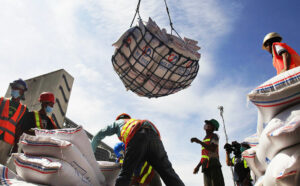Agri dep’t preference for imports seen as hurdle to RCEP approval

THE Department of Agriculture’s (DA) recent track record of preferring imports as opposed to developing productive farms has been cited as a potential deal-breaker as the Senate struggles to approve the Regional Comprehensive Economic Partnership (RCEP) trade deal.
The DA has “an unparalleled record of reckless importation, which is why stakeholders are very fearful,” Senator Imelda Josefa Remedios R. Marcos said at a hearing of the chamber’s foreign relations committee, which she chairs.
She said that in previous hearings the DA has cited the Philippines’ obligations to the World Trade Organization (WTO), which she identified as the beginning of the agriculture industry’s downfall.
“They are really blaming the WTO and the entry of several products in the country without regulation,” Ms. Marcos said, “almost as if we surrendered our rights as a country to control, somehow, the entrance of these products.”
“We cannot just import and import even during the harvest season or the fishing open season,” she added. “You have to understand. The products are overflowing without being sold, yet imports continue to increase.”
Agriculture Assistant Secretary-designate for Policy, Research and Development Noel A. Padre said that the DA’s mandate of ensuring food security takes heed of the necessity of improving domestic productivity, and described part of the approach taken as “distributing our domestic production from surplus areas to deficit areas.”
“We encourage imports only when domestic production is not enough to address our demand,” he added. “With respect to the agriculture and fishery sector under RCEP, we assure the committee that we will continue to engage our stakeholders.”
Ms. Marcos added that RCEP proponents must also address questions about the trade deal’s impact on micro, small and medium enterprises (MSMEs).
“Since 1944, we have not done anything to level up our… micro and small enterprises; that is our fault I presume,” Ms. Marcos said.
“Unfortunately, we simply cannot drum up the votes until these issues are addressed,” she added.
The Senate failed to give its concurrence to the RCEP agreement before it adjourned sine die on June 1, despite appeals from economic managers and business groups.
RCEP, which started coming into force in participating countries on Jan. 1, involves Australia, China, Japan, South Korea, New Zealand and the 10 members of the Association of Southeast Asian Nations (ASEAN).
The Philippines is one of two countries yet to ratify RCEP, along with fellow ASEAN member Myanmar. One of the other holdouts, Indonesia, signed on at the end of August.
Asked how RCEP will benefit MSMEs, Trade Assistant Secretary Allan B. Gepty said that the trade deal specifically addresses this concern by seeking to integrate MSMEs into the global value chain.
“When it comes to sourcing raw materials, you can do so in 14 RCEP parties,” he said.
Ms. Marcos countered by saying that international trade appears to be the preserve of medium-sized companies and up.
“The small companies will also have participation, maybe not for purposes of accessing foreign markets, but at least part of the supply chain internally or domestically and eventually, upgrading themselves to integrate in the global value chain,” Mr. Gepty said.
According to the 2020 List of Establishments issued by the Philippine Statistics Authority, the Philippines had 957,620 registered businesses, of which 952,969 or 99.51% were MSMEs and 4,651 or 0.49% large enterprises. Micro enterprises accounted for 88.77% of all MSME establishments, followed by small enterprises at 10.25% or 98,126 and medium enterprises at 0.49% or 4,716.
Mr. Gepty assured that in the extreme cases, the Philippines has the sovereign right to withdraw from the treaty, if need be. As for opting out of certain provisions, he said such action is not prohibited, but could have consequences.
“There is no prohibition, you can do that under the Vienna Convention on the Law of Treaties but it will be subject to the acceptance of the other parties,” he said.
Foreign Affairs Secretary Enrique A. Manalo said the exact mechanism for opt-outs would be the article in RCEP allowing “the general review of the treaty every five years for the purpose of updating it or making it more relevant.”
“So if, for example, we were to go down that road, we could also cite for general review, which we will certainly push for if we are not happy within five years of implementation,” he added.
Mr. Gepty said that safeguards also include available trade remedies that the Philippines has maintained under the WTO, anti-dumping and countervailing provisions.
Ms. Marcos ordered the committee secretary to put together a technical working group to study the implications of ratifying the treaty. — Alyssa Nicole O. Tan




